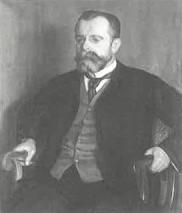Related Research Articles
Leo Kofler was an Austrian-German Marxist sociologist. He ranks with the Marburg politicologist Wolfgang Abendroth and the Frankfurt school theoreticians Max Horkheimer and Theodor W. Adorno among the few well-known Marxist intellectuals in post-war Germany. However, almost nothing of his work was ever translated into English, and he is therefore little known in the English-speaking world. Kofler had his own, distinctive interpretation of Marxism, which connected sociology and history with aesthetics and anthropology.
Imanuel Geiss was a German historian.
Otto Friedrich Bollnow was a German philosopher and teacher.
Hartmut Boockmann was a German historian, specializing in medieval history.
Wolfgang Zapf was a German sociologist.
Bernhard Schweitzer was a German classical archeologist.

The Sybel-Ficker controversy is the name given to a dispute in the second half of the 19th century between the historians Heinrich von Sybel (1817–1895) and Julius von Ficker (1826–1902). It involved a discussion concerning relations between Rome and the Holy Roman Empire, which also had an important bearing on the Austria–Prussia rivalry—whether Austria was to be part of a federal Germany, or whether Germany would continue without Austria.
Fred K. Prieberg was a German musicologist. He was a pioneer in the field of history of music and musicians under the Nazi regime.
Rudolf Braun was a Swiss historian.

Ulrich Pfeil is a German historian based in France.
Otto Vossler was a German historian.
Werner Gembruch was a German historian.
Michael Maaser is a German historian, archivist of the Goethe University Frankfurt.
Notker Hammerstein is a German historian. His research interests are mainly in the field of University history and history of science as well as the history of the Holy Roman Empire of the German Nation.
Gerrit Walther is a German historian.
Franz Schnabel was a German historian. He wrote about German history, particularly the "cultural crisis" of the 19th century in Germany as well as humanism after the end of the Third Reich. He opposed Nazism during the Second World War.
Johannes Kunisch was a German historian. He held chairs of early modern history at the Goethe University Frankfurt. (1972-1976) and the University of Cologne (1976–2002). Through his publications Kunisch became one of the leading German early modern historians. His biography Frederick the Great, published in 2004 and widely acclaimed, gave lasting impulses to Prussian research.
Franz Brendle is a German historian and scholar teacher.
Rudolf Vierhaus was a German historian who mainly researched the Early modern period. He had been a professor at the newly founded Ruhr University Bochum since 1964. From 1971, he was director of the Max-Planck-Institut für Geschichte in Göttingen. He became known for his research on the Age of Enlightenment.

Erich Marcks was a German historian.
References
- 1 2 Paul Gerhard Schmidt (ed.): Humanismus im deutschen Südwesten. Biographische Profile. Thorbecke, Sigmaringen 1993, S. 290.
- ↑ Ulrich Muhlack: Staatensystem und Geschichtsschreibung. Ausgewählte Aufsätze zu Humanismus und Historismus, Absolutismus und Aufklärung. Berlin 2006.
- ↑ Das zeitgenössische Frankreich in der Politik Humboldts on WorldCat
- ↑ Einführung in die Geschichte der klassischen Philologie on WorldCat
- ↑ Geschichtswissenschaft im Humanismus und in der Aufklärung. Die Vorgeschichte des Historismus on WorldCat
- ↑ Savonarola. Die grossen Mächte. Politisches Gespräch. on WorldCat
- ↑ Historisierung und gesellschaftlicher Wandel in Deutschland im 19. Jahrhundert on WorldCat